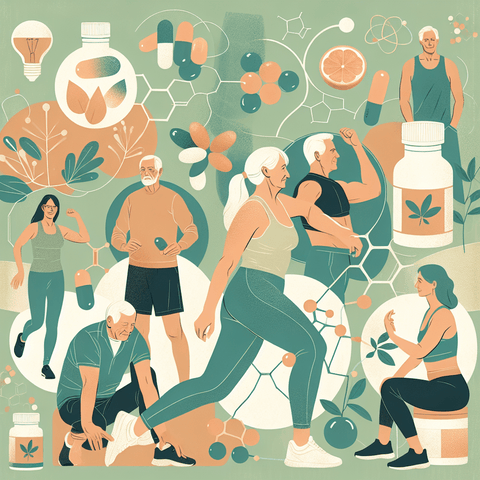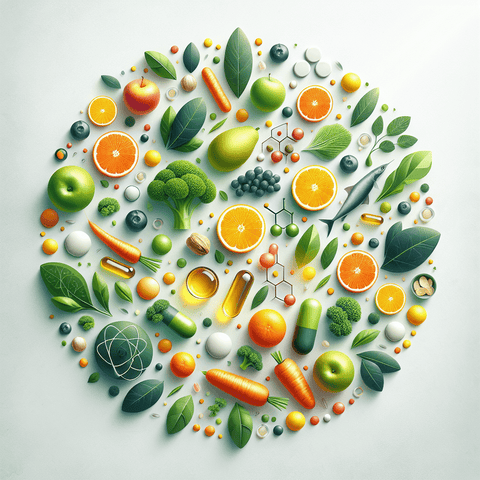Introduction
As we grow older, our bodies undergo a natural transformation that affects everything from muscle mass to hormonal balance and how efficiently we absorb nutrients. Turning 50 represents a significant milestone where nutrition and lifestyle choices become even more crucial to overall health and longevity. Despite efforts to eat a well-balanced diet, age-related changes often make it challenging to meet nutritional needs through food alone. This is where dietary supplements can make a meaningful difference.
With a vast array of vitamins, minerals, and health supplements available, it can be overwhelming to determine which choices truly support healthy aging. What works for someone in their 20s or 30s may not be suitable for an older adult. Adults over 50 face unique health challenges such as increased risk of osteoporosis, cardiovascular issues, compromised immunity, joint degeneration, and cognitive decline. Ensuring the body gets targeted support during this stage of life can significantly contribute to vitality, mobility, and overall well-being.
This comprehensive guide aims to help readers understand which supplements are most beneficial after age 50. We will address the physiological reasons behind changing nutritional needs, highlight the top science-backed supplements, and provide practical tips for tailoring your supplement routine. Whether you're new to supplementation or looking to optimize an existing regimen, this article will empower you to make informed decisions that align with your personal health goals.
Best Supplement After 50: Unlocking the Key to Healthy Aging
Choosing the best supplement after age 50 is not a one-size-fits-all process. It requires an understanding of the physiological changes the body undergoes in later decades and the common health challenges older adults may face. From reduced nutrient absorption to increased oxidative stress, aging presents several hurdles to maintaining optimal health. Supplements can bridge the gap between nutritional demand and dietary intake, providing targeted support where it’s needed most.
One of the most significant changes post-50 is the body’s diminished ability to absorb key nutrients, particularly vitamin B12 and calcium. Moreover, aging adults often experience decreased gastric acid production, which can further inhibit nutrient absorption from food. This makes a strong case for incorporating bioavailable, well-formulated supplements into a daily routine.
Common health concerns among this age group include:
- Joint pain and inflammation from wear and tear or osteoarthritis
- Increased risk of cardiovascular disease
- Bone density loss leading to osteoporosis
- Weakened immune function
- Cognitive decline and memory issues
Supplements specifically designed for older adults can significantly support healthy aging by offering concentrated doses of vital nutrients like vitamin D, calcium, magnesium, and omega-3 fatty acids. Products such as the Vitamin D collection on Topvitamine are tailored to support bone health, immune defense, and mood regulation, all critical aspects at this life stage.
The ideal supplement for someone over 50 depends on their individual health profile, diet, and lifestyle. However, incorporating a balanced mix of essential nutrients in bioavailable forms, while avoiding megadoses that exceed recommended daily intakes, can promote healthier aging and help maintain independence and vitality for years to come.
Aging Nutrition: Tailoring Your Diet and Supplements for Age-Related Changes
After age 50, dietary needs and nutrient absorption change dramatically due to factors such as slower metabolism, hormonal changes, and reduced cellular regeneration. These shifts necessitate a more intentional approach to both diet and supplementation, emphasizing nutrient density over caloric intake.
Key nutritional concerns that arise with aging include:
- Decreased absorption of fat-soluble vitamins like A, D, E, and K
- Reduced production of intrinsic factor, which impairs vitamin B12 uptake
- Increased need for calcium and vitamin D to maintain bone integrity
- Loss of lean muscle mass, increasing protein requirements
To support these shifting needs, older adults should focus on anti-inflammatory, antioxidant-rich foods, lean proteins, and fiber. However, even the most optimized diets may fall short due to factors like reduced appetite, medication interference, dental issues, or food intolerances. This makes supplementation an essential tool for many seniors seeking optimal health.
Specific nutrients warrant special attention:
- Vitamin D: Essential for bone health, calcium absorption, and immune support. Adequate levels reduce the risk of osteoporosis and fractures.
- Omega-3 fatty acids: Found in EPA and DHA, they support heart and brain health, reduce inflammation, and may help preserve cognitive function. Consider exploring the DHA and EPA Omega-3 supplement collection.
- Vitamin K2: Works synergistically with vitamin D to regulate calcium deposition and protect arteries and bones. Explore the Vitamin K collection on Topvitamine.com.
- Magnesium: Vital for over 300 enzymatic reactions, it supports energy production, cardiovascular health, and muscle function. Access magnesium-rich supplements here.
Supplementation strategies include incorporating multivitamins tailored for individuals over 50, using targeted formulas based on lab work, and choosing clinically validated, EFSA-compliant products. In summary, age-related changes necessitate a diet and supplement protocol that evolves with the body. Staying proactive allows aging individuals to preserve energy, mobility, and vitality well into later life.
Senior Health Supplements: Essential Vitamins and Minerals for Older Adults
Vitamins and minerals are the cornerstone of any effective supplement regimen for adults over 50. Due to aging-related changes in the gastrointestinal system, many individuals face increased risk of deficiencies. Addressing these gaps is essential for maintaining overall health, managing chronic conditions, and reducing the risk of age-associated disease.
Vitamin D: One of the most vital nutrients for seniors, vitamin D supports calcium absorption and immune function. It helps maintain strong bones and has been associated with improved mood and cognitive health. Unfortunately, vitamin D is deficient in many older individuals, especially those who spend little time outside. Supplementing with vitamin D3 is effective, and you can browse high-quality options from the Topvitamine Vitamin D product line.
Vitamin B12: As we age, stomach acid production decreases, impairing B12 absorption. B12 is critical for nerve function, red blood cell production, and energy metabolism. A deficiency can lead to fatigue, memory problems, and even neuropathy. Sublingual or injectable B12 formulations are especially effective for those over 50.
Calcium: Bone density typically declines with age, and calcium is a key element in preventing osteoporosis. However, calcium should always be taken alongside vitamin D and K2 for optimal absorption and deposition in bones rather than arteries. Products that combine these synergistic nutrients are ideal for seniors.
Omega-3 fatty acids: Research supports the benefits of omega-3s for heart health, joint comfort, and cognition. Derived mostly from fish oil, EPA and DHA are long-chain omega-3s with anti-inflammatory properties. Explore premium omega-3 options through the Topvitamine Omega-3 collection.
Other vitamins like C and E provide antioxidant protection, supporting immunity and reducing oxidative damage at the cellular level. Consider sourcing your Vitamin C needs here.
Finally, selecting high-quality supplements is paramount. Look for products that are third-party tested, free of unnecessary fillers, and made with bioavailable ingredients. Supplements should meet EFSA safety standards and match recommended dosages—not exceed them without the guidance of a healthcare professional.
Post-50 Vitamin Options: Choosing the Right Vitamins for Your Changing Body
Your vitamin needs in your 50s and beyond are different from earlier life stages. With aging comes reduced digestive efficiency, higher inflammation levels, and increased vulnerability to nutrient loss due to chronic medication use or lifestyle changes. Therefore, focusing on potency, purity, and suitability is essential when selecting vitamin supplements.
Here’s a breakdown of key vitamins worth considering after 50:
- Vitamin D3: Supports bone metabolism, reduces risk of falls, and offers immune protection. Seniors often require 800 IU to 2,000 IU daily, depending on individual blood levels.
- Vitamin K2 (MK-7): Crucial for directing calcium to the bones and preventing arterial calcification. Works synergistically with vitamin D3 to protect bone and cardiovascular health.
- Vitamin B-Complex: Includes B1, B2, B3, B6, B12, folate, and others that are involved in energy metabolism, brain function, and nervous system support. B vitamins can be depleted by medications like metformin or proton pump inhibitors.
- Vitamin C: Functioning as a powerful antioxidant, vitamin C aids in immune support, collagen formation, and oxidative stress reduction. Older adults may benefit from 500–1000 mg daily.
Multivitamin formulations specifically created for adults over 50 are widely available and can be a convenient way to cover most needs. These blends are developed with modified dosages to reflect age-related requirements, ensuring no nutrient is in excess or deficiency.
Be mindful of factors such as:
- Your individual nutrient requirements (based on blood tests or clinical symptoms)
- Possible interactions with medications
- Any known allergies or intolerances
Always opt for vitamin products manufactured according to Good Manufacturing Practices (GMP) and free from unnecessary additives. A great example of curated senior vitamins can be found in Topvitamine’s product assortment for essential and condition-specific support.
Age-Related Mineral Support: Strengthening Bones, Heart, and Metabolism
Minerals are just as essential as vitamins for people over 50, with deficiencies potentially leading to severe health outcomes like osteoporosis, fatigue, or cardiovascular issues. Addressing mineral intake through informed supplementation becomes essential as the absorption from food gradually declines with age.
Magnesium: This mineral plays a central role in over 300 biochemical reactions, aiding in muscle function, nerve signaling, energy production, and bone density. It also supports cardiovascular health and aids in blood sugar regulation. Older adults often experience lower magnesium due to decreased dietary intake or increased loss through the kidneys. Visit Topvitamine's Magnesium category to explore options suited for aging needs.
Zinc: Important for the immune response, wound healing, and taste perception. Zinc deficiency can lead to impaired immune function—a major concern for aging populations. However, zinc must be supplemented at appropriate levels to avoid disrupting copper balance.
Selenium: A powerful antioxidant that protects cells from oxidative stress. It's also vital for thyroid function and immune protection. The recommended upper limit must be strictly adhered to, as selenium can be toxic in high doses.
Iron: While iron is crucial for oxygen transport and cellular energy, seniors should be cautious with supplementation unless a deficiency is diagnosed. Excess iron can contribute to oxidative stress and inflammation, especially in postmenopausal women and older men.
Balancing these minerals helps mitigate risks of anemia, cognitive decline, and cardiovascular disease. The challenge lies in obtaining the right dosage without interfering with the absorption of other nutrients. For example, calcium can compete with magnesium or iron during digestion, so timing and formulation become important considerations.
It’s highly beneficial to select mineral supplements with chelated forms (e.g., magnesium citrate or glycinate) that offer better absorption. Also, combining minerals with supportive vitamins ensures more efficient utilization. Seniors should periodically test for mineral levels to optimize their personalized supplement program.
Optimal Wellness After 50: Integrating Supplements into a Holistic Lifestyle
Supplements alone won't make you healthy, but when integrated into a holistic lifestyle, they can significantly enhance overall outcomes. True wellness requires an alignment of proper nutrition, routine physical activity, sleep hygiene, mental health care, and consistent supplementation.
Key components of a healthy post-50 lifestyle include:
- Nutrition: Focus on whole foods like vegetables, fruits, lean proteins, complex carbohydrates, and heart-healthy fats. Supplements help fill the micronutrient gaps.
- Exercise: Regular movement improves cardiovascular health, maintains muscle mass, and enhances mood. Resistance training can also help preserve bone density.
- Sleep: Aim for 7–8 hours nightly. Sleep supports cognitive health, hormone regulation, and immune function.
- Stress Reduction: Chronic stress contributes to inflammation and a variety of health issues. Mindfulness techniques, hobbies, or social connections can ease mental load.
Supplements serve the role of “nutritional insurance,” offering a strategic buffer against dietary limitations and aging-related absorption issues. By choosing EFSA-compliant supplements—especially those harmonious with other lifestyle habits—you’re likely to experience greater vitality, reduced disease risk, and an improved quality of life.
Personalized nutrition planning with regular re-evaluation of supplement efficacy will ensure that efforts align with changing health statuses, medication adjustments, or newly emerging goals. Incorporating your supplements into daily routines—such as breakfast or bedtime rituals—can vastly improve compliance and effectiveness.
Consult Your Healthcare Provider: The Importance of Professional Guidance
While many supplements are overtly marketed as safe and natural, taking them indiscriminately or in high doses may cause unintended consequences, especially for those managing chronic conditions or taking medications. It is crucial to involve healthcare providers when designing a supplement routine.
Discussing supplements with your general practitioner or registered dietitian ensures that:
- You’re not exceeding safe dosages
- Supplementation won’t interfere with medications
- Your choices are based on legitimate needs, not trends or misinformation
Blood tests can identify deficiencies in vitamin D, B12, and iron, among others. A tailored strategy can also identify if you need specific types of magnesium (e.g., bisglycinate vs. oxide), or if fat-soluble vitamins are right for you, especially concerning liver or kidney function.
Also, monitoring outcomes ensures the strategy is effective. This means rechecking vitamin D levels after 3–6 months or adjusting omega-3 intake based on inflammatory markers or triglyceride levels. Such a data-driven approach reduces risk while maximizing benefit.
Finally, always bring your supplement labels to appointments. Ingredients like vitamin K, for example, may interfere with blood thinners. Surround yourself with a knowledgeable health team to guide you toward effective, sustainable supplementation plans promoting lasting health in your golden years.
Conclusion: Prioritizing Your Health with the Right Supplements After 50
Aging gracefully doesn’t mean accepting declining health—it means adapting. Our bodies may change after 50, but we are not powerless. Supplements offer an effective way to support bone health, immunity, cardiovascular function, and cognitive clarity when dietary intake begins to falter. However, selecting the best supplement demands consideration of your body’s unique needs, a sound understanding of nutrition science, and guidance from healthcare professionals.
By focusing on evidence-backed vitamins and minerals like vitamin D, B12, magnesium, omega-3 fatty acids, and others, you can promote healthy aging and continue to enjoy life actively and energetically. Trusted sources like Topvitamine.com offer a wide variety of supplements compliant with EFSA regulations, rooted in science, and designed to optimize wellness for aging adults.
Remember, supplementation is an art and a science—one that works best when paired with a balanced diet, adequate sleep, regular physical activity, and stress management. Empower yourself to age with strength, clarity, and vitality by making informed supplement choices tailored to you.
FAQs About Supplements After 50
Q: What’s the single most important supplement to take after 50?
A: While vitamin D often ranks at the top due to its role in bone and immune health, the best supplement depends on your individual health. Blood tests help identify specific deficiencies.
Q: Can I get all my nutrients from food alone?
A: While theoretically possible, decreased absorption, reduced appetite, and lifestyle factors make complete nutrient intake through food alone difficult after 50. Supplements can help bridge the gap.
Q: Is it dangerous to take multiple supplements?
A: Not inherently, but combining certain supplements can lead to excessive intake of fat-soluble vitamins or mineral imbalance. Always consult a doctor or registered dietitian before starting a multi-supplement plan.
Q: How long should I take supplements for?
A: Supplements for nutrient maintenance and deficiency correction are often taken long-term. Check effectiveness through periodic testing and adjust dosage accordingly with medical support.
Q: Can supplements reverse aging symptoms?
A: Supplements aren't a fountain of youth, but they can reduce the risk of age-related diseases and support better energy, mobility, and cognition when used appropriately.
Important Keywords
- best supplement after 50
- senior health supplements
- vitamins for adults over 50
- nutrients for aging
- omega-3 supplements for seniors
- vitamin D for bone health
- magnesium for energy support
- supplements for immune system
- healthy aging
- calcium and vitamin D combo



